Steve Allen
Streeter Click
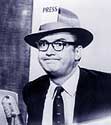


Renaissance Humourist
Steve Allen (1921-2000) wrote 54 books and 8,500 songs. He recorded 75 albums. For 40 years, he created and hosted a steady stream of weekly prime-time television shows, for NBC, CBS, ABC, PBS and Westinghouse Television (Group W). He had two wives; one, Jayne Meadows, for 46 years. His first marriage, to Dorothy Goodman, produced three sons: Steve, David, Brian. He and Meadows had one son, Bill. Though best known as a humourist, his time management skills were amazing. As skilled as he was, Allen never got around to writing a book on time management. This is likely the only topic he never wrote about, but his greatest skill.
Belle Montrose, his mother, was the funniest woman in vaudeville, said Milton Berle. Carroll Allen, his father, was her straight man. Allen died in 1923, and Steve went to live with the Montrose family, on the South Side of Chicago, while his mother toured.
Stephen Valentine Patrick William Allen was born, in New York City, on St. Stephan's Day, the 26th of December, 1921. Do you think, if he was born two days earlier, we'd know him as Eve Allen?.
It was common, among Irish Catholic families, to name children after several relatives. If one of the relatives became rich, he or she might look kindly on their namesake.
Come to think of it, Groucho was named after an uncle, Julius Henry Marx, whom his mother, Minnie Marx, thought secretly rich. "When Uncle Julius died, his estate consisted of four items," said Groucho, "a colloid dickey, an 8 ball, 7 dull razor blades and an unpaid debt of $85," owed to the symbolic head of Marx household, Frenchy.
During the 1940-1941 school year, Steve Allen transferred to the Phoenix Union High School from Hyde Park High School, in Chicago. None know why. In 1941, he enrolled in Drake University and, for 1942, switched to the Arizona State Teacher's College, in Tempe. Allen was a tad restless.
Allen got his first radio job at KOY-AM, Phoenix, in 1942. Later in the year he joined the Army and trained for the infantry. He spent World War II at Camp Roberts, in California.
In 1945, Allen worked KFAC-AM, Los Angeles. Soon he moved to the Mutual Broadcasting System to co-host a weekday comedy show called, "Smile Time," with Wendell Noble. In 1946, he moved to CBS, which owned and operated KNX-AM, in Los Angels.
KNX, Los Angeles, 10 October 1946.
The roots of his television work are clearly evident in this fast one-hour radio show.
Week nights, Allen did a live, one-hour show, with a live audience, from the KNX studios, at Columbia Square, in Hollywood. When the scheduled guest, Doris Day (1924-), didn't show, one night, Allen grabbed the wired microphone and spent an hour talking with members of the standing room only audience. Thereafter, he adlibbed and played a record or two, but mostly joked with audience members. It didn't matter if the guest showed up or not. Often, it was better if the guest didn't show up.



On 10 October 1946, Al Jolson (1886-1950) guested with Allen. Jolson (above), was an highly controlled performer, with a temper to match, who was easily offended. Still, he was the super-star of the first half of the 20th century. His talent unparalleled, Jolson, born Asa Yoelson, in Russia, held sway over vaudeville, Broadway and Hollywood. Sinatra wished he had such authority, and Cruise phantizes. During a charity show, at the Paramount Theatre, in New York City, in the 1940s, an unscheduled Jolson walked on stage and sang for 6 hours. Not one person left, donations piled up and only the police closing the theatre to end his performance.
On 10 October, with Steve Allen, Jolson wobbles a bit. He finds the spontaneity hard to handle, and admits it. Never, he tells Allen, has he worked without a script and he's not sure he likes it.
When he arrived for the appearance, Jolson says, he was wary. "Watching from the control booth, Allen made it look easy," although it was tough." After watching Allen, Jolson wanted to give it a try.
Jolson has an agenda: to knock the sponsor that cancelled his show. As Jolson jabs the sponsor, Allen finds ways to make it naturally funny. Eventually, Jolson finds his stage legs. When he does, a refreshing Jolson, warmer, more personable than believed, emerges. By the end of the show, he says, repeatedly, how glad he is he tried working without a script and, uncharacteristically, gushes over Allen for the chance.
Later in the day, "The Jolson Story," starring Larry Parks, is premiering and hammy Al can't resist mentioning it every ten seconds. In a typical Jolson-controlled setting, his self-promotion was irritating. Allen was able to pull back the facade, and let Asa out. Every mention of the movie got a bigger laugh, from the audience and Jolson. Although more common, if mostly staged, today, such spontaneity was a major event in 1946: a rarity. Click 10 October 1946 to hear the full, 60 minute show.
CBS Network, Summer Replacement for "Our Miss Brooks."
The KNX-AM show lead to network radio for Allen. For 13 weeks, "The Steve Allen" show replaced the number one show on radio, at the time, "Our Miss Brooks." "Our Miss Brooks" had a lot of "thought gags," humour you had to think about for a split second to get. The audience was thus well-prepared for Steven Allen.
The first episode of the summer series aired Sunday 4 June 1950. The week before, Allen appeared in the final episode of the season, on "Our Miss Brooks." Supposedly traveling from New York to Los Angeles, he lost his way and stopped to ask for directions. Miss Brooks, who had a gimlet eye for a handsome man, was pleased to help out.
On the first "Steve Allen Show," Groucho (1890-1977) makes a brief cameo as does Jack Benny (1894-1972). Eve Arden (1908-1990), star of "Our Miss Brooks," is the main guest. The show's a bit bumpy, the conceptualization and writing aren't up to network standards and Allen seems blissfully awkward, but it works. Click 4 June 1950 to hear the complete show.
WCBS-TV, New York City, 1952.
After a successful summer network run, CBS moved Allen to New York City. The idea, it seems, was to work up a network quality television show for Allen. Frank Stanton, President of CBS, was pushing hard for television; many, such as William Paley, CEO and majority shareholder, wanted to continue doing what CBS did best: radio. While internal differences distracted CBS, Allen did a nightly show on WCBS-TV.
At NBC, programming boss, Pat Weaver, lucked into a goldmine. The "Today" show filled a void, was as inexpensive as a game show and as hugely popular, and obscenely profitable. He used the "Today" show template for the "Home" show, which aired mid-days, hosted by Arlene Francis (1907-2001).
Weaver wanted a late night companion for these shows, but couldn't find anything suitable in-house. Jerry Lester was hosting a local late night show on WNBC-TV, and a transition to the network seemed natural. Weaver thought Lester too coarse for a national audience, and kept looking.
Supposedly, Weaver and a pal were having a drink, late one night, in a bar near Rockefeller Centre, where NBC was headquartered. Watching Allen on the television set, behind the bar, Weaver said to his pal, "Now, that's exactly what I want the late night show to be." Not long after, Weaver plucked Allen from CBS for the 'Tonight' show.
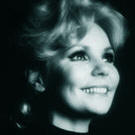


Here's a sample audio, a partial show, of Allen on WCBS-TV, in New York City. the guest is 21 year-old Teresa Brewer (1931-2007). Cute and petite, Brewer (left) began touring in 1936, at age five, after a winning debut on "The Major Bowes Amateur Hour" radio program. Bowes was the "American Idol," of his time, launching the careers of dozens of major stars. Brewer had her first hit record, "Music! Music! Music!," in 1950. "Till I Waltz Again, with You, was her follow up hit. She also had a hit, "I Love Mickey," about baseball player Mickey Mantel. Later in her career, she focused on jazz, performing with Count Basie and Duke Ellington, among others. She passed 17 October 2007, of a neuro-muscular disease. Click here for a brief obituary from AP.
Brewer lived in New York City and she was often available, on limited notice, for the "Tonight" show. At the same time, Dick Summer was "Platter Pappa," on WNRC-AM, in New Rochelle, a New York City suburb of sorts. "Every time I played, "Put Another Nickel In...In The Nickelodeon," Brewer' would call to say thanks for playing her record.
"The title of that song is a kind of a time line," says Summer. "78 RPM records played on 'Juke Boxes' for a nickel in those days, for real. "Three-for-a-dime in some places.
Allen opens the show with a joke or two, quickly segueing into the inadvertent humour in a well-intentioned pamphlet on how to save money. "Do your own washing, at home, don't take to dry cleaners," is the first helpful hint, he says. This is authentic Allen: finding humour and, sometimes, irony or satire, in the routine and ordinary. In a sense, Allen was the George Carlin of his time. Two Irish guys, from New York City, finding laughs in the details of daily life. Both are inadvertent satirists.
It's easy to understand why "Pat" Weaver was enthralled by Steve Allen. He was simple, funny and thought provoking. More important, he built a template that's made NBC millions of dollars in profits, every year since 1954. Click 28 December 1952 to hear the show.
While working WCBS-TV, Allen guested on many network game shows, such as "To Tell the Truth." CBS was slowly building his national presence and credibility. For about two years, Allen was a regular panelist on the top-rated game show, "What's My Line"; Arlene Francis was also a regular panelist on the show.
Steve Allen made his last appearance, at least for 18 months, on "What's My Line" as the "Mystery Guest." It was a ploy to promote the 'Tonight' show, which he started 8 days later, on "another" network. CBS gave in to one of its power-house shows, and allowed the cross network promotion, a rarity in the early days of of network television.
Satirist, Fred Allen, replaced comedian, Steve Allen, on "What's My Line." On 17 March 1956, Fred passed away, suddenly, on West 57th Street, while walking his dog. Steve Allen didn't blink, says Gil Fates, producer of "What's My Line," when we asked him to sit in for one more time, the next night.
Johnny Carson got his first shot at the national audience when he substituted for an ailing star, Red Skelton. So, too, did Steve Allen, although the star he replaced, Arthur Godfrey, wasn't ailing, but late, very late.
From 1946 to 1959, Arthur Godfrey (1903-1983) had three prime time shows on CBS television and radio. "Arthur Godfrey and Friends" ran on radio, in 1948, and radio and television from 1949 to 1959. "Talent Scouts," an early version of "American Idol," aired on radio from1946 to 1956 and television from 1949 to 1958. Finally, Godfrey had a weekend prime time show, which culled the best clips from his two week night shows.
As did Johnny Carson, Godfrey reveled in double entendre repartee. Godfrey, as did Steve Allen, preferred to "toss out the script," and perform extemporaneously. He especially liked to tease sponsors, as did Allen, which increased the attention and after-show chatter about their products.
About the Godfrey fill-in, Steve Allen told Larry King (1933-), that CBS "asked me ... about two hours before air time, it was a live show, could I please run over to the ["Talent Scout"] studio and do the show that night. I'd only seen it once or twice, but they were so desperate I couldn't say no. ... Arthur [Godfrey, an avid aviator], it seems, had flown down to Miami. There was a storm. He couldn't fly back ... in time for his show. So I did it, and made a total mess of it."
What Allen, in later years, thought a mess, turned out to be the stuff of show business legend. In Godfrey style, Allen improvised a Lipton commercial. He prepared tea and instant soup, as scripted, but poured both into the ostensibly favourite ukulele of Godfrey and played a song. In Miami, Godfrey is said to have thought it hilarious, and the national audience agreed.
Over the next few days, viral word-of-mouth about Allen and his antics spread across the USA and Canada. Allen got national praise, and instant acceptance. The television audience demanded to see more of him. Pat Weaver, at NBC, acted quicker than Frank Stanton, at CBS. Allen began the 'Tonight' show on Monday 27 September 1954.
The 'Tonight' Show
Allen opened the first 'Tonight' show saying, "This is 'Tonight,' and I can't think of too much to tell you about it, except I want to give you the bad news first: this program is going to go on forever. ... you think you're tired now. Wait until you see one o'clock roll around."
"In those days," says Dick Summer, "the 'Tonight' show originated, for real, that is, live, in startling black and white, from the Hudson Theater in New York. What a thrill. When the 'On-air' light went red, that is, 'on,' the show went out coast to coast. [There were] no edits, no delays, what happened, happened, and lots happened."
Allen preferred comedy to guests. The regular, "Man on Street," segment featured, among others, Don Knotts (1924-2006), as K. B. Morrison, a maker of fireworks. The KB character formed the nervous, fidgeting, high-strung character Knotts worked throughout his career. The KB, by the way, stood for "Ka Boom."
Always restless, Allen left "Tonight," in 1957, for a prime time show. NBC scheduled "The Steve Allen Plymouth Show" against CBS juggernaut, "The Ed Sullivan Show." Both shows, both men, appealed to the same viewers. The channel knob, on television sets across Canada and the USA, got a full work out between 8 pm and 9 pm, every Sunday, as viewers switched back and forth between Sullivan and Allen.
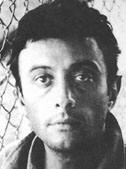


The increasingly controversial comedian, Lenny Bruce, Bruce (above) didn't cross any lines. Appearing on a top-rated, prime-time show was sure to widen his appeal. He stayed so far inside the limits of acceptability, that he came across as bland, much the way Bill Hicks did when appearing on "Late Night, with David Letterman," a generation later.
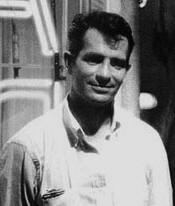


Shortly after publication of "On the Road," author, Jack Kerouac, appeared on the "Plymouth Show." Sitting at a piano, Allen introduced Kerouac. Always more interested in performing than talking, the interview was brief. Allen asked Kerouac, "Are you nervous?" In a shaky voice, Kerouac says, "Naw." Over a light bed of improvisational jazz, played by Allen, Kerouac read from "On the Road." Together, Kerouac, the rebel, and Allen, the middle-class humourist, created one of the most memorable moments on television. John Antonelli uses the moment to open and close his documentary, "Kerouac: the movie."
Sullivan and CBS ultimately won the ratings war. After a two-year back-and-forth ratings battle, NBC took defeat poorly and Allen moved on. CBS had more affiliates and, therefore, more viewers, even in a shared audience situation. Dr. Stanton had prepared CBS, well, for television.
Westinghouse Television syndicated the 'Tonight' show format, with Allen hosting, from 1962 through 1964. One episode, which featured Lenny Bruce, who was by then routinely arrested on obscenity charges, wasn't aired. Another episode featured the first televised performance by Frank Zappa. The usual skits prevailed, often spilling out of the studio and on to the street in the Hollywood Ranch Market area.
Looking back, Allen seems quaint, his humour as an old time movie. Topicality wasn't his style, as it was for Fred Allen and, to an extent, Johnny Carson. The humour of Steve Allen was general and usually genial, which usually sustains. Still, pouring tea and instant soup into a ukulele wouldn't cut it, today, audiences are far too cynical, too taken with their self-importance. The humour of Steve Allen was innocent, and there's no room for such sentiments, anymore.
Warm is the word most often used to describe Allen. Although he could seem distracted or disaffected -- thinking ahead to the next sketch, most likely -- to television audiences, in person, Allen considerate, focused and warm. Dick Summer couldn't agree more.
Dick Cavett on Steve Allen
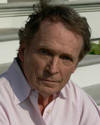


"Steve Allen," writes Dick Cavett, "noted ... the more comedy you write, the more you can write." (New York "Times": 30 May 2007). "It happened to me," says Cavett (left). "Thrown instantly into the front lines, as I was, of daily writing for Jack Paar on The Tonight Show a task nothing at Yale prepares you for it seemed ... each day of the week got a bit easier. Monday hardest, Friday a breeze. Fridays jokes seemed to write themselves. Rust set in on the weekend and again, Monday wasn't easy."
Dick Summer on Steve Allen
"I was a page at NBC," says Dick Summer, "while Steve Allen was doing 'Tonight, from New York."
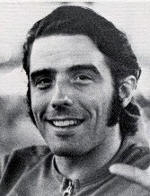


Dick Summer (right) is an East Coast radio personality, of considerable notoriety. His legendary status was built over more than 40 years of providing persistently high quality radio. His work is especially creative, well-performed and, most important, highly entertaining. Dick worked mostly late evening and over night shows, and is easily understood as a next generation Steve Allen on radio. Especially notable were shows on WBZ-AM, in Boston, and WNBC-AM, in New York City. Long, compelling interviews with Sandy Baron and Rod McEwen, for example, kept WBZ-AM listeners up early into the morning. At WNBC-AM, his Friday night, "Mouth to Ear," had more listeners than some prime-time shows on the same station. Most recently, Dick can be heard as the voice of Binder and Binder. "I was also working at my college station," says Summer, "WFUV, Fordham University, a Jesuit school with campuses in the Bronx; Lincoln Centre, in Manhattan and Tarrytown, just north of New York City. "One day, I got the nerve to ask Allen for an interview. Instead of blowing me off, he agreed, inviting me up to his apartment. When I got there, he offered me a coke and some cookies to eat, while we were doing the interview.
"To his immense credit, Allen didn't hurry me [, as many others would]. He gave me around a half hour of his time, and a smile when I left." Allen was a class act, even a college kid had his respect and time.
"As I mentioned," says Summer, "I was a page at NBC, when Allen did the 'Tonight' show. What an education." What an experience.
"There were times when scheduled guests didn't show up or were late. Steve had absolutely no trouble in dealing with that. Once, he just took a dollar bill out of his wallet, pinned it to a board, had the camera do an extreme close up (ECU) and he talked about all the icons on it. It was amazing.
"Allen," concludes Summer, "was classified as a 'comedian.' He was really a poet-philosopher." Not unlike Dick Summer.
Conclusions
Allen remains known for success in many areas -- song writing, social criticism, radio, movies and television -- not just one. His music and lyrics include standards, such as "Impossible"; "This Could be the Start of Something Big," which came to him in a dream, and the "South Rampart Street Parade." He adlibbed, effectively, with studio audiences, did on the street interviews and made prank phone calls on his television shows. He portrayed Benny Goodman, in a 1955 B-movie, known for its score, but not the acting. He wrote several books of social criticism, including "Vulgarians at the Gate" (2001), which, lacking in depth, got public attention for important issues.
These days, mainstream entertainers mostly possess narrow talent, which is shallow, at best. The talent of Steve Allen was wide, and moderately deep. He was among the last of the renaissance entertainers.
Sources
----------
Gil Fates (1978) "What's My Line: TV's most famous panel show." Prentice Hall.
CNN, "Larry King Show" transcript.
Streeter Click is editor of GrubStreet.ca.
- Grub Street Philosophy: 2
- Phillip Marlow: radio detective
- Dick Summer Top 40
- Tanna Frederick
- Remembering the Pioneers
- Bucky Wayne, the Legend
- Early Tom Baroni
Click above to tell a friend about this article.
Recommended
- Sjef Frenken
- Reading
- A Third View of Evolution
- Streamlining the World

- Jennifer Flaten
- Walking the Dog
- Phil Spector
- Parenting Years

- M Alan Roberts
- I Got Crabs
- A Drunk Loser
- Said a Little Prayer

Recommended
- Matt Seinberg
- College Radio Reunion
- Tax Season 2012
- Radio Sisters

- Streeter Click
- Courtney Love Writes
- Look Now, Pay Later
- Shane McGown Live, Bio

Recommended
- M Adam Roberts
- Howling at the Moon
- Mercy Me
- No Greater Love

- Ricardo Teixeira
- The Future
- There is a Light
- Harmony







